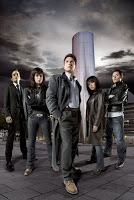 Here’s one of my most recent Gair Rhydd articles:
Here’s one of my most recent Gair Rhydd articles:
The Whole World in His hands
Caleb Woodbridge argues that the mixing of politics and faith, when executed correctly, is essential is a real difference is to be made in the world.
Religion and politics – two topics never to discuss in polite company. And while to talk about one of these may be unfortunate, to mix the two together is often seen as not just careless but downright dangerous.
It’s easy to see why many people get so nervous when faith and politics entwine. The Crusades are a terrible reminder of the evil that can be done when the two become confused, and are a terrible monument to the medieval church’s blindness to the teachings of Jesus.
At the end of last year, gair rhydd writer Ed Vanstone argued “It’s time that religious beliefs stopped undermining democracy”. Writing about the euthanasia debate, he called on us to “stand up to the religious and fight for our civil liberties”. For some, bringing religion into political debate is clearly a no-no.
Some of the questions Vanstone raised about the role of Bishops in the House of Lords were fair enough. But if he were to be consistent, then he would have to exclude all belief systems from politics, including his own self-confessed “teeth-gnashing atheism”.
There is no neutral position free of philosophical, ethical and religious assumptions and presuppositions, and many political questions involve questions of morality, human nature, and the purpose of society and humanity. These questions are all in some sense religious, and we ignore them at our peril.
It simply will not do to chop up different knowledge and truth into little bits and try and keep them separate – politics in this box over here, and religion in that box over there. Life is an interconnected whole. More importantly, God is Lord of all the universe, and there is not a square inch of life and reality that he is not sovereign over, including the political sphere.
You may disagree, but if so, then join the debate! Make your own voice heard, rather than seeking to silence views other than your own – that’s how democracy works. Democracy is thrashing out our differences on the anvil of debate, giving every voice a fair hearing.
While it is impossible to truly separate religion and politics, there are good and bad ways of mixing them. Get it wrong, and you’re in danger of such things as state religion and the suppression of religious freedom. But get the combination right, and together they can be a powerful force for good.
One of the heroes of the twentieth-century is Martin Luther King, a Baptist minister who spearheaded the Civil Rights movement in America. Two hundred years ago, the hard work and campaigning of William Wilberforce and the Clapham group of proto-lobbyists helped stir the conscience of this nation against the slave trade and bring about its end in Britain.
Without people like these involving their faith in politics, this world would be a darker place. The faith of the likes of Wilberforce and King was not incidental to their actions, but at the very core of their convictions, actions and dreams. When King told the world that he had a dream, he spoke of a dream of freedom guaranteed by the dream of the coming victory of God, “that one day every valley shall be exalted, every hill and mountain shall be made low, the rough places will be made plain, and the crooked places will be made straight, and the glory of the Lord shall be revealed, and all flesh shall see it together.”
Hope is one of the most powerful forces in the universe, giving us the courage to attempt to change the world. Politics today is so often ideologically bankrupt, impoverished of dreams and bereft of hope. The power of nightmares scares us into voting for them to save us from terrorism or immigration or the latest other bogeyman. The idea of making the world a better place today seems hopelessly naïve.
An ancient proverb says, “Where there is no vision, the people perish.” In these days of cynicism and of empty secular imagination, we need more than ever faith that can transform the world, seeking justice and an end to oppression, and working towards the hope of heaven while here on earth.








